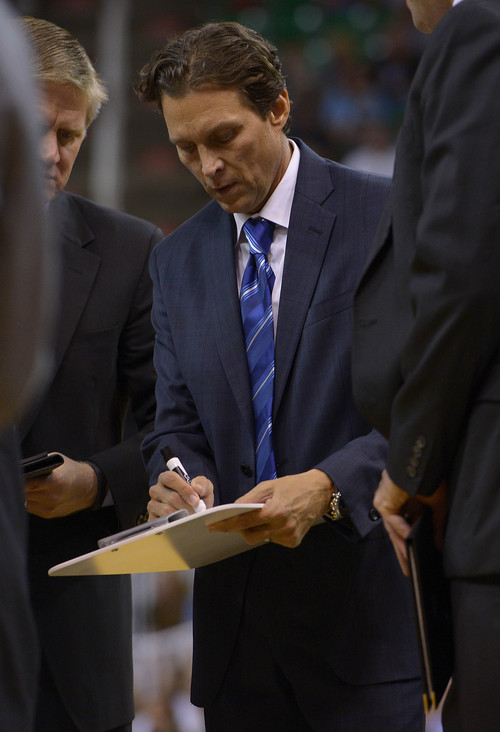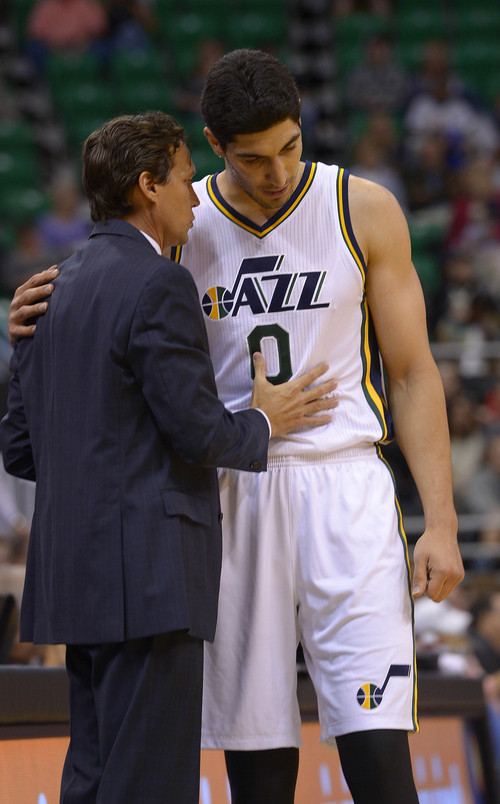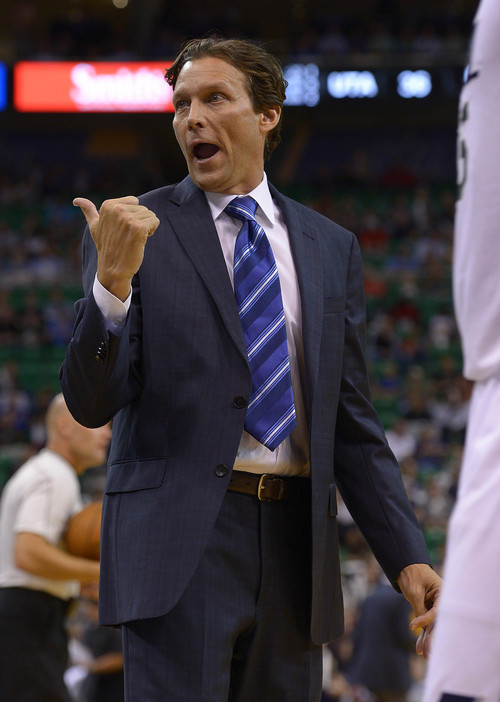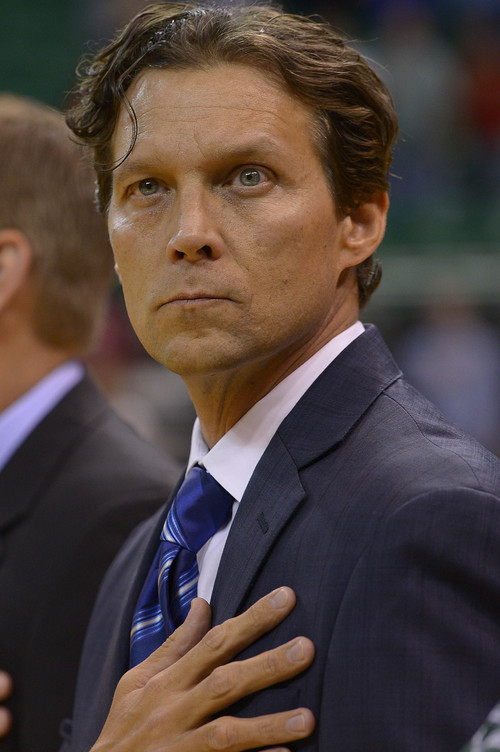This is an archived article that was published on sltrib.com in 2014, and information in the article may be outdated. It is provided only for personal research purposes and may not be reprinted.
Twenty-four.
That's the over/under on the number of wins the Jazz will get this season, as figured by Vegas. Only the 76ers' over/under win total is lower.
Let's toss that around for a minute, using it as a general expectation. If the Jazz win 24 — one fewer than they won last season — that would give them 58 losses. It would also give them the worst record since the Jazz's first year in Salt Lake City in 1979-80.
Hope, though, is not lost. There's a new direction, a fresh sense of purposefulness regarding what the Jazz are doing.
The Jazz kind of blew it a season ago. They had a leftover coach, a Jerry Sloan disciple, who a lot of people liked on a personal level in the last year of his deal who wasn't on the same page as management. He was trying to save his job while the higher-ups were attempting to build for the future.
It was a contradiction.
That's why guys like Richard Jefferson and Marvin Williams got as much time as they did, at the expense of younger players.
Those days are gone.
There may still be areas of some disagreement at the helm — nobody walks in complete lockstep — but the goals, the methodology and even the realistic trajectory of the team are accepted and agreed upon by ownership, management and coaches. That's part of the reason there's now a different feeling around this iteration of the Jazz.
The other part is the attitude of the players themselves.
They want to play the way Quin Snyder wants them to play. They want to rebound and get run-outs and play in space and share the ball and pick and roll and spot up to shoot 3's. They even want to play defense in and out of transition for a couple of reasons: 1) Snyder has told them they will be held accountable for doing so, and 2) they know it will stop and trigger easy points on the break.
A year ago, the Jazz ground themselves to the nub working an offense that often failed against more experienced teams in the half-court. It was too deliberate, too laborious. The prospect of getting, say, 10 more "free" points per game off the break is appealing to them. It should be.
As for the offense itself, if anybody wants a blueprint, look at what the Spurs do. The Jazz will try to set up patterns on the floor, to move the ball unselfishly and seek the best shot — and be encouraged to squeeze off those bombs when they are available.
When was the last time anybody heard a Jazz coach say in the postgame of any game, preseason or not, that he wanted 3-pointers in bulk?
Snyder the other night: "I want to see more of them."
He wants to see more of what sets up those open 3's, and when they're there, he wants those shots taken.
Players can get excited about that kind of thinking, even on nights when the winning doesn't come. And this season, there will be a lot of nights when it doesn't. The Jazz's young core knows what defeat feels like. It suffered through it 57 times a year ago. How long it will take for new additions such as Dante Exum and Rodney Hood, and those new schemes on the floor, to diminish the losses and add to the wins is a bit of a mystery.
Built into Dennis Lindsey's we-won't-skip-any-steps mantra is an allowance for losses he knows are coming. But even with the beat down the remaining Jazz players absorbed last season, spirits are higher this time around. The plan seems clearer to the young veterans.
Twenty-four wins? Fifty-eight losses?
Whatever the numbers end up being, the Jazz's route to them is unencumbered by the drag of past ambiguity. The goals, the methodology, the blueprint, the defense-leads-to-offense, the sharing-leads-to-scoring have been bought off on inside the organization and inside the locker room.
Fans might be a tougher sell.
There are two camps: the one that remains upset that the Jazz didn't re-sign guys like Al Jefferson, Paul Millsap and Kyle Korver. And the one that knows the Jazz were mediocre in the West with those guys and are glad Lindsey let them go and now is developing younger players, rebuilding through the draft and with moderate moves, stockpiling financial firepower and room under the cap for the seasons ahead.
That second camp is right, as long as Lindsey makes good decisions.
The losses might stack up this season, but hopelessness won't — not if Derrick Favors, Gordon Hayward, Enes Kanter, Trey Burke, Alec Burks, Exum, Hood and Rudy Gobert improve as they go.
For one more season, total number of wins won't matter as much as the steps taken forward. After that, those steps had best lead to a growing number of wins.
GORDON MONSON hosts "The Big Show" with Spence Checketts weekdays from 3-7 p.m. on 97.5 FM/1280 and 960 AM The Zone.
Twitter: @GordonMonson









